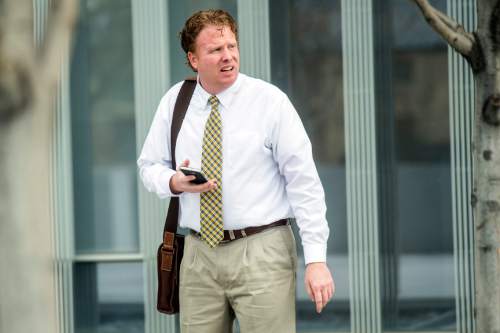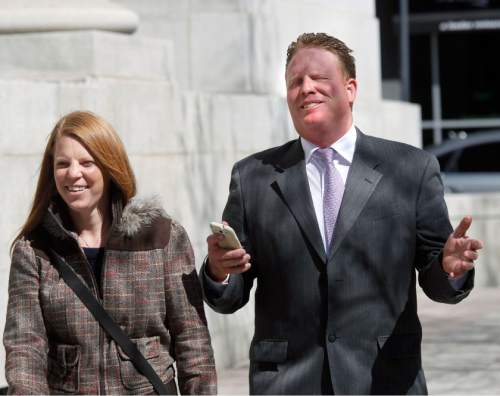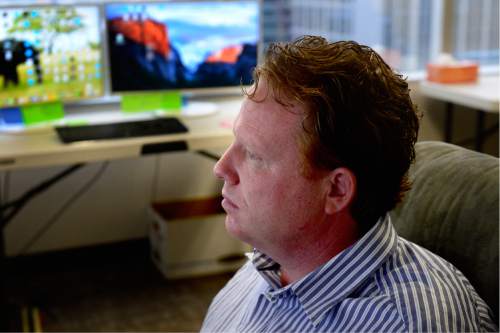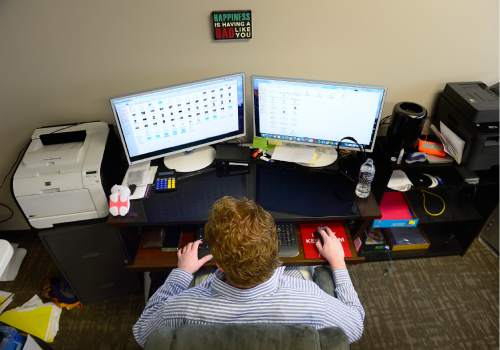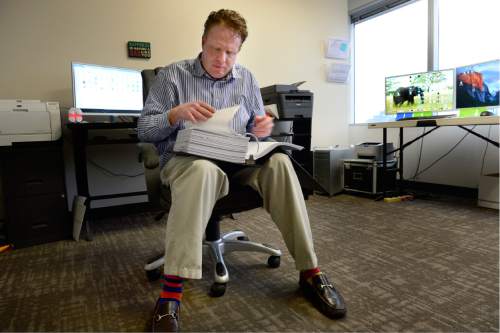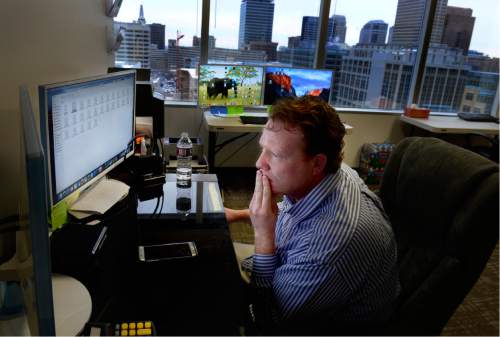This is an archived article that was published on sltrib.com in 2016, and information in the article may be outdated. It is provided only for personal research purposes and may not be reprinted.
Utah businessman Jeremy Johnson conducted his first cross-examination of a witness Tuesday on the second day of a trial on charges that allege fraud in his online marketing company and in which he is acting as his own attorney.
The trial was taking place as documents filed in court showed that a state investigation was seeking evidence about why federal prosecutors pursued the case against Johnson while recusing themselves from a probe into the actions of now former Utah Attorneys General Mark Shurtleff and John Swallow in which Johnson has been thickly entwined and is listed as a witness in state court prosecutions of the two.
Attorney Marcus Mumford filed emails from Davis County Attorney Troy Rawlings, the chief prosecutor in Shurtleff's state criminal case, in which Rawlings asked for information from the U.S. Attorney's Office about conflicts that caused it in May of 2013 to withdraw from the federal Shurtleff/Swallow investigation yet continue to prosecute Johnson. The U.S. Attorney's Office has declined to say why it was recused.
Mumford used the emails to renew a motion he had made requesting that the U.S. Attorney's Office turn over items he believes are relevant to the Johnson case in which he represents another defendant, Scott Leavitt, the accountant for Johnson's I Works company.
One Rawlings email requested possible evidence that he said he needs in order to turn them over to attorneys for Shurtleff as part of the legal obligation to provide any materials that might be relevant to Shurtleff's defense. The email, sent on Friday to the U.S. Attorney's Office here and in Colorado, which is handling legal matters related to the Shurtleff/Swallow cases, said the materials are "critical items related directly to one of the key defense theories."
In addition, though, the emails also show that Rawlings is trying to delve deeply into why the U.S. Justice of Department did not prosecute Johnson, Swallow and others, including some from the online poker industry, for allegedly trying to bribe U.S. Sen. Harry Reid while he was Senate majority leader.
Johnson alleged in January of 2013 that Swallow helped connect him with payday loan industry leader Richard Rawle and they cooked up a plan to get money to a Reid associate in order to solicit the senator's help in stalling an investigation by the Federal Trade Commission into Johnson's company.
Swallow has said the effort was intended to enlist a lobbyist to help Johnson. Part of the money that Johnson and Leavitt paid to Rawle went to Jay Brown, a longtime Reid associate, while other monies went to a Washington, D.C., lobbying firm.
In addition, Johnson has said that he sent a check from online poker funds in SunFirst Bank, where he and others were processing player payments, to a Los Angeles attorney and Johnson believes it was intended for Reid in order to try to push through a bill in Congress to ensure that online poker playing was legal in the United States.
U.S. District Judge David Nuffer said Tuesday, after the jury had been excused for lunch, that Mumford's motion was not directly related to the ongoing trial and he wouldn't consider it until at least 28 days after the jury renders a verdict.
"This motion is a diversion from our focus," Nuffer said.
The judge, however, turned down a prosecution request to seal the four exhibits included with Mumford's motion.
The Mumford motion and a previous one sought to dismiss the case or recuse the federal prosecutors because of alleged coercion. The original motion was based on a text that defendant Bryce Payne had sent prior to accepting a plea agreement. Payne said in the text that the plea agreement "makes me say things that I did not believe at the time."
On Tuesday, Johnson cross-examined Martin Elliott, global head of brand protection for credit card company Visa USA, who was the prosecution's first witness.
The questioning went relatively smoothly until Johnson brought up a recording that he, defendant Ryan Riddle and I Works employee Loyd Johnston had of a 2009 telephone conversation with Elliott. That prompted Assistant U.S. Attorney Jason Burt to jump out of his chair and object that the recording had not been turned over to prosecutors as rules require and that it may have violated California privacy laws.
"It's a violation of California penal code to surreptitiously record a call," Burt said.
Johnson replied, "What he said on the call directly contradicts the evidence he gave the grand jury."
Nuffer ruled that Johnson could not use the recording without showing it had been supplied to the prosecution, the circumstances under which it was made and whether it violated California law.


